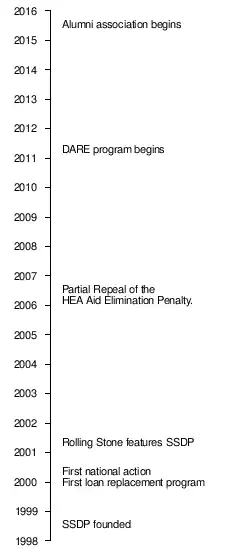Students for Sensible Drug Policy
Students for Sensible Drug Policy (SSDP) is an international non-profit advocacy and education organization based in Washington D.C. SSDP is focused on reforming drug policy in the United States and internationally. SSDP neither condones nor condemns drug use.
 | |
| Founded | 1998 |
|---|---|
| Founders | Shea Gunther, Kris Krane, Shawn Heller, Kris Lotlikar |
| Type | Nonprofit |
| Focus | Drug Policy, War on Drugs, Marijuana legalization, Drug checking, Psychedelics, Criminal justice reform |
Area served | United States, United Kingdom, Austria, Bolivia, Chile, China, Costa Rica, Denmark, France, Gambia, Ghana, India, Israel, Jamaica, Kenya, Liberia, Nepal, New Zealand, Ireland, Mexico, Canada, Central and South America, Africa, Australia, Serbia, Sierra Leone, Tanzania |
Key people | Betty Aldworth, Stacia Wallis, Vilmarie Narloch, Luis Montoya, Rob Hofmann, Róisín Downes, Jake Agliata, Rachel Wissner, Kris Krane, Troy Dayton, Kris Lotlikar, Lauren Mendelsohn, Jesse Stout, KT Klens |
Employees | 7 |
Volunteers | 4000 |
| Website | www |
History
In the fall of 1996, members of the Student Drug Reform Movement (SDRM) begin to chat over the internet using a Drug Reform Coordination Network (DRCNet) discussion page. In 1997, the Rochester Cannabis Coalition (RCC) at the Rochester Institute of Technology applied to become an official student organization dedicated to fighting the War on Drugs; RIT denied RCC's application and ultimately expelled the lead organizer, Shea Gunther, who would go on to become an SSDP founder. In winter 1998, SDRM members at University of Massachusetts Amherst hosted a conference for about 50 students, many of whom would go on to join the inaugural founding membership class of SSDP.
That conference led to the First National Gathering in Washington, DC the following year, where attendees decided to collectively to form SSDP into a national organization and elect a board of directors composed of one representative from each of the five schools that had chapters operating under the SSDP name (Hampshire College, University of Wisconsin–Madison, George Washington University, American University, and Rochester Institute of Technology). SSDP undertook a series of actions and events which contributed to partial repeal of the Higher Education Act Aid Elimination Penalty (HEAAEP).
Chronology

January 2000 – First National Action. At and around the College Convention 2000 in New Hampshire, SSDP students protested the HEAAEP.
Spring 2000 –First Loan Replacement Program. Hampshire College instituted the first HEAAEP loan replacement program and its president was the first to come out against the HEAAEP.
March 3, 2001 – Legislation to Repeal. A coalition of U.S. House Democrats introduced legislation that would repeal a moratorium on federal financial aid to college students with drug convictions, citing denial of aid for 8,162 students that school year.
March 15, 2001 – "Students VS. the Drug War." An article featuring SSDP appeared in Rolling Stone.[1] HEAAEP victim Marisa Garcia '00 was profiled and the article marked SSDP's big break into public awareness.
Spring 2001 – Colleges Urge Change. Five Oregon colleges passed resolutions urging changes to the HEAAEP. Thirteen leading education associations representing admissions officers, community and state colleges, financial aid administrators and student groups sent a strongly worded letter outlining flaws in the HEAAEP to the head of the DEA.
February 2002 – Souder Confronted About HEAAEP. Members of SSDP attended an event to get long-awaited answers from Rep. Mark Souder (R-IN) about the HEAAEP legislation he authored.
2006 – Partial Repeal of the HEA. Congress, responding to pressure from SSDP and other advocates, scaled back the HEA Aid Elimination Penalty, taking away its "reachback effect" so that it would only affect students convicted for offenses that occur while they are enrolled in college and receiving aid.
SSDP has expanded from a single chapter in upstate New York created by a handful of students to a network of over 300 chapters worldwide.
Board
Students for Sensible Drug Policy is governed by a Board of Directors . The board of directors represents SSDP's chapters at the national level. At least two-thirds of the members of SSDP's Board of Directors are students or young people elected by SSDP's chapters each year during the organization's national Congress. Amy Hildebrand, DePaul University, is the current Chair.
Main issues
Global Drug Policy
SSDP is a member of the Economic and Social Council and thus a consultant to its functional commissions. As such, SSDP has been advocating for policy reform and youth inclusion at the Commission on Narcotic Drugs, including the 2016 Special Session of the UN General Assembly on the World Drug Problem[2] and the High Level Ministerial Segment in 2019.
SSDP Global Fellow, Orsi Fehér, has held the office of Treasurer on the board of the Vienna NGO Committee on Drugs between 2018–2020.
SSDP's former International Program Coordinator, Jake Agliata, is a co-founder of the Paradigma Youth Coalition.
The organization also coordinates youth participation in global campaigns such as Support. Don't Punish and International Overdose Awareness Day.
911 Good Samaritan policies
A campus Good Samaritan policy or medical amnesty policy is a policy designed to prevent students from hesitating to call for medical assistance in the event of a medical emergency related to alcohol or other drugs.
Just Say Know
Just Say Know, is a peer-to-peer drug education program, provides evidence-based drug information on campus, teaches students to recognize and address dangerous behaviors and attitudes, empowers them to reduce drug-related harm within their communities, and fosters analysis of the relationship between drug policy and drug use. Just Say Know provides a platform from which we create the values future generations will hold about drug policy and drug use culture as we move forward, valuing education over incarceration.
Marijuana policy reform
SSDP chapters provide the ground forces and the teams of volunteers for many large state and federal campaigns.
Students and chapters work on state and local marijuana policy reform by supporting legislation and ballot initiatives for decriminalization, medical marijuana, taxation and regulation, and lowest priority policies.
Pell Grants for incarcerated students
Students for Sensible Drug Policy partners with the College and Community Fellowship and The Fortune Society as part of the Education from the Inside Out Coalition[3] to help remove barriers to higher education funding facing students in prison.
Harm reduction advocacy
Harm reduction is the act of mitigating the negative consequences associated with drug use. SSDP provides tools for its members to advocate for the implementation of harm reduction measures, as well as to engage in direct service work.
Psychedelic legalization
SSDP provides resources for its members to advocate for legalization of psychedelics.
Student drug testing
According to its official website, SSDP opposes student drug testing.[4]
Campus chapters
SSDP is made up of students and community members organized on college and high school campuses across the world. In 2015–2016, SSDP chapters were on 320 campuses, included 4,312 student activists and engaged in 135 drug policy initiatives.[5] Across the United States, there are eight regional divisions: Heartland, Mid-Atlantic, Midwest, Mountain, Northeast, Pacific, Southeast, and Southwest.
International
Several international chapters in 28 different countries across 5 continents engage in reform at community, national, and regional levels; represent the voices of youth from their countries at the United Nations; and share their experiences fighting the drug war with their fellow SSDPers all over the world.
The SSDP international network has doubled in size through 2018 and expanded its structure to include regional fellowships to represent the specific needs of the Latin American, West African and European chapters.
Alumni Association
The SSDP Alumni Association is composed of individuals who determine their own activities and levels of involvement. Individuals are organized geographically into regional SSDP Alumni Associations based on where they currently reside. However, individuals may of course participate in other regional networks by joining additional regional SSDP Facebook groups (ex: if the region you attended school is different from where you currently live).
The Deputy Director is responsible for managing the mentoring program by matching mentors and mentees, as well as training mentors on appropriate and effective mentorship.
DARE Committee
The Diversity, Awareness, Reflection, and Education committee (DARE) publishes a Monthly Mosaic to highlight the intersection between drug war, communities, and a broad range of issues.
Since its founding in March 2011, DARE has taken on the challenges of strengthening diversity in all its forms within SSDP. The committee endeavors to ensure that the range of perspectives & personal experiences of all communities and individuals negatively impacted in the War on Drugs are represented & integrated into SSDP & the drug policy reform movement at large. DARE does this by creating a welcoming, open, & safe space for all stakeholders.
See also
References
- Marsh, Katherine (11 October 2001). "Students vs. Congress". Rolling Stone. Retrieved 26 March 2020.
- "Special Session of the General Assembly UNGASS 2016". www.unodc.org. Retrieved 26 March 2020.
- "Archived copy". Archived from the original on 2016-11-24. Retrieved 2016-12-01.CS1 maint: archived copy as title (link)
- "Campaigns". SSDP. Retrieved 26 March 2020.
- "2015-2016 Annual Report" (PDF). 2016. Retrieved 26 March 2020. Cite journal requires
|journal=(help)